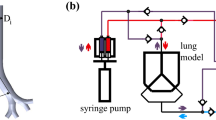Abstract
ON the interesting subject of the need for oxygen on Mount Everest, Prof J. Barcroft has made the remark, before Section I of the British Association, that the whole matter is now merely “an engineer's problem”: the problem of designing a light and efficient oxygen breathing apparatus. This point of view is ably supported by Prof. Margaria.1 There is, however, something more: namely, the disadvantage of acclimatisation in a man using such apparatus. If it is one of the ‘open circuit’ type, acclimatised breathing causes a huge waste of oxygen and adds correspondingly to the difficulty of transportation. Yet a man dare not relinquish this physiological condition, even if he could. For if he relinquished it, he would die of asphyxia as soon as he took the apparatus off.
This is a preview of subscription content, access via your institution
Access options
Subscribe to this journal
Receive 51 print issues and online access
$199.00 per year
only $3.90 per issue
Buy this article
- Purchase on Springer Link
- Instant access to full article PDF
Prices may be subject to local taxes which are calculated during checkout
Similar content being viewed by others
References
Margaria, R., NATURE, 129, 397, March 12, 1932.
Douglas, Haldane, Henderson and Schneider, Phil. Trans. Roy. Soc., B, 203, 185; Feb. 7, 1913.
Henderson, Y., NATURE, 117, 747; May 29, 1926.
Author information
Authors and Affiliations
Rights and permissions
About this article
Cite this article
HENDERSON, Y. Oxygen and Everest. Nature 129, 649–650 (1932). https://doi.org/10.1038/129649c0
Issue Date:
DOI: https://doi.org/10.1038/129649c0
Comments
By submitting a comment you agree to abide by our Terms and Community Guidelines. If you find something abusive or that does not comply with our terms or guidelines please flag it as inappropriate.



